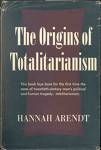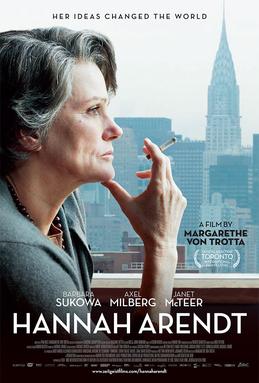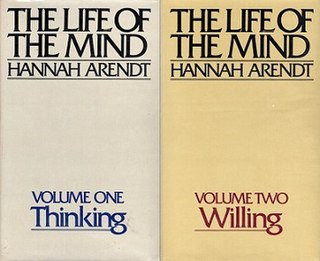
Hannah Arendt was a German-American historian and philosopher. She was one of the most influential political theorists of the 20th century.

Karl August Varnhagen von Ense was a German biographer, diplomat and soldier.

The Origins of Totalitarianism, published in 1951, was Hannah Arendt's first major work, where she describes and analyzes Nazism and Stalinism as the major totalitarian political movements of the first half of the 20th century.

Gershom Scholem was a German-born Israeli philosopher and historian. Widely regarded as the founder of modern academic study of the Kabbalah, Scholem was appointed the first professor of Jewish mysticism at Hebrew University of Jerusalem.

Rahel Antonie Friederike Varnhagen was a German writer who hosted one of the most prominent salons in Europe during the late 18th and early 19th centuries. She is the subject of a celebrated biography, Rahel Varnhagen: The Life of a Jewess (1957), written by Hannah Arendt. Arendt cherished Varnhagen as her "closest friend, though she ha[d] been dead for some hundred years". The asteroid 100029 Varnhagen is named in her honour.

Eichmann in Jerusalem: A Report on the Banality of Evil is a 1963 book by the philosopher and political thinker Hannah Arendt. Arendt, a Jew who fled Germany during Adolf Hitler's rise to power, reported on the trial of Adolf Eichmann, one of the major organizers of the Holocaust, for The New Yorker. A revised and enlarged edition was published in 1964.
Seyla Benhabib is a Turkish-born American philosopher. Benhabib is a senior research scholar and adjunct professor of law at Columbia Law School. She is also an affiliate faculty member in the Columbia University Department of Philosophy and a senior fellow at the Columbia Center for Contemporary Critical Thought. She was a scholar in residence at the Law School from 2018 to 2019 and was also the James S. Carpentier Visiting professor of law in spring 2019. She was the Eugene Mayer Professor of Political Science and Philosophy at Yale University from 2001 to 2020. She was director of the program in Ethics, Politics, and Economics from 2002 to 2008. Benhabib is well known for her work in political philosophy, which draws on critical theory and feminist political theory. She has written extensively on the philosophers Hannah Arendt and Jürgen Habermas, as well as on the topic of human migration. She is the author of numerous books, and has received several prestigious awards and lectureships in recognition of her work.
Elisabeth Young-Bruehl was an American academic, psychotherapist and psychoanalyst. She published a wide range of books, most notably biographies of Hannah Arendt and Anna Freud. Her 1982 biography of Arendt won the first Harcourt Award while The Anatomy of Prejudices won the Association of American Publishers' prize for Best Book in Psychology in 1996. She was a member of the Toronto Psychoanalytic Society and co-founder of Caversham Productions, a company that makes psychoanalytic educational materials.

"Theses on the Philosophy of History" or "On the Concept of History" is an essay written in early 1940 by German philosopher and critic Walter Benjamin. It is one of Benjamin's best-known, and most controversial works.

Deborah Hertz, is an American historian whose specialties are modern German history, modern Jewish history and modern European women's history. Her current research focuses on the history of radical Jewish women.

Hannah Arendt is a 2012 biographical drama film directed by Margarethe von Trotta and starring Barbara Sukowa. An international co-production from Germany, Luxembourg and France, the film centers on the life of German-Jewish philosopher and political theorist Hannah Arendt. The film, distributed by Zeitgeist Films in the United States, opened theatrically on 29 May 2013.
Sara Grotthuis, born Sara Meyer, also known as Sophie Leopoldine Wilhelmine Baroness von Grotthuis and as Sara Wulff by her first marriage, was one of the most well-known "salonnières" of the late 18th and early 19th centuries in Berlin.

The Life of the Mind was the final work of Hannah Arendt (1906–1975), and was unfinished at the time of her death. Designed to be in three parts, only the first two had been completed and the first page of the third part was in her typewriter the evening of the day she suddenly died. The unfinished work was edited by her friend, author Mary McCarthy, and published in two volumes in 1977 and 1978.

Love and Saint Augustine was the title of Hannah Arendt's 1929 doctoral thesis. An English translation including revisions by Arendt was not published until 1996.
Dagmar Barnouw was a German cultural historian. From 1988 until her death, she served as professor of German and comparative literature at the College of Letters, Arts and Sciences at the University of Southern California (USC).
Daisy L. Hobman was a feminist writer, biographer, social worker, and founding member of Brighton and Hove Humanist Group. She was the first person to gain an Oxford diploma in social studies.
Liliane Weissberg is an American literary scholar and cultural historian specializing in German-Jewish studies and German and American literature. She is currently the Christopher H. Browne Distinguished Professor in Arts and Sciences and Professor of German and Comparative Literature at the University of Pennsylvania. She received, among others, a Guggenheim Fellowship, the Humboldt Research Award for her research on German-Jewish literature and culture and the Berlin Prize of the American Academy in Berlin, and holds an honorary degree from the University of Graz.
This is a bibliography of works by and about the philosopher Hannah Arendt.












